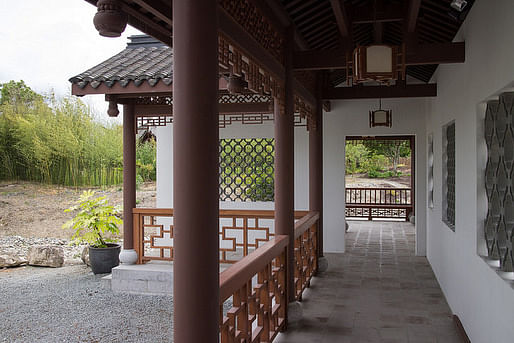
 Chinese garden design is an artistic practice that, by most accounts, has evolved over thousands of years. Several of Suzhou's famous gardens claim to have been founded in the first and second centuries C.E., their design evolving over time with expansion, destruction, restoration, etc. While many of China's remaining classical gardens are now protected landmarks (and, thus, frozen in their design), the typology is best appreciated as an ever-evolving synthesis of landscape and architecture, with a design that is constantly in flux, with each generation making their own modifications and refinements.
Chinese garden design is an artistic practice that, by most accounts, has evolved over thousands of years. Several of Suzhou's famous gardens claim to have been founded in the first and second centuries C.E., their design evolving over time with expansion, destruction, restoration, etc. While many of China's remaining classical gardens are now protected landmarks (and, thus, frozen in their design), the typology is best appreciated as an ever-evolving synthesis of landscape and architecture, with a design that is constantly in flux, with each generation making their own modifications and refinements.
Which is to say, I can't criticize Seattle's Chinese Garden too harshly, given that they've only completed a small portion of their ambitious plan. What exists now, in a park adjacent to South Seattle Community College, is disappointing, consisting of a barren courtyard and one small pavilion, with the rough contours of future ponds sculpted in gravel. If and when the garden is completed, it will resemble a mid- to large-scale garden, with independent pavilions linked by covered corridors, but little of the ambiguity and spatial layering that make the smaller gardens so compelling.
While Seattle's Chinese Garden will likely be larger than both Vancouver's Sun Yat-sen Garden and Portland's (excellent) Lan Su Garden, I doubt it will beat either for authenticity or spatial interest. On the question of authenticity, the Chinese gardens in both Portland and Vancouver, though recent constructions, are at least located on urban sites, in those cities' historic Chinatown districts. Seattle's Chinatown is practically nonexistent, whatever historic architecture once existed now replaced with industrial sheds, railroad equipment, etc, and properly named the "International District" after the subsequent waves of immigrants who have made the area their home. Seattle was, historically, a hotbed of racist anti-Chinese sentiment, especially during the late 1800s when other West Coast cities were somewhat more receptive. (Does this explain why the Chinese food is better in San Francisco?). Where Vancouver's and Portland's gardens could act as cultural focii of their historic districts, Seattle has no such Chinatown to anchor, and the garden design suffers somewhat from the lack of urban context. That said, with an expansive site and (presumably) mutable plans, the Garden could turn into something great, given enough time.
More info: http://www.seattlechinesegarden.org/
Returning to the US after years of work and travel abroad, Evan Chakroff attempts to bring a global perspective to analysis of the relatively-unknown architectural traditions of his new home, Seattle, Washington.... and beyond....
No Comments
Block this user
Are you sure you want to block this user and hide all related comments throughout the site?
Archinect
This is your first comment on Archinect. Your comment will be visible once approved.